The Week Ahead in New York Politics, August 13

New York City Hall
What to watch for this week in New York politics:
A fundraising deadline for candidates for state office passed last week and the latest campaign finance filings are due Monday, August 13, with the state Board of Elections. With just one month till the September 13, and with several competitive primary races for statewide and legislative seats, candidates have been trying to muster all the resources they can to reach voters. Many insurgent challengers in Democratic primaries this year have been more focused on reaching small donors in large numbers as they face off against well-funded incumbents.
As always, there's a great deal happening all over the city, with many events to be aware of - see our day-by-day rundown below.
***Do you have events or topics for us to include in an upcoming Week Ahead in New York Politics?
e-mail Gotham Gazette editor Ben Max: This email address is being protected from spambots. You need JavaScript enabled to view it.***
The run of the week in detail:
Monday
President Donald Trump will headline fundraisers for US Representatives Claudia Tenney and Elise Stefanik on Monday.
From 10 a.m. to 5 p.m. on Monday, WeWork and New York Immigration Coalition will host a voter registration day open to the public at WeWork's 110 Wall Street location.
At 1 p.m. Monday, the state Senate Standing Committees on Labor and Economic Development will hold a public hearing at Binghamton University’s Symposium Hall, to discuss the state’s Minority-and-Women-Owned Business Enterprises (MWBE) program.
Tuesday
At the City Council on Tuesday
-- The Subcommittee on Zoning and Franchises will meet at 9:30 a.m.
-- The Subcommittee on Landmarks, Public Siting, and Maritime Uses will meet at noon.
-- The Subcommittee on Planning, Dispositions, and Concessions will meet at 2 p.m.
At 1 p.m. Tuesday, Brooklyn Borough President Eric Adams will launch the Platinum Edition of his "BK Sings" karaoke competition, for Brooklyn residents over the age of 60, at the United Senior Citizens Center in Sunset Park.
At 6:30 p.m. Tuesday, City & State will host its 2018 “Albany 40 Under 40” reception at Battery Gardens in Battery Park City, honoring 40 individuals under the age of 40 who work in state government and politics. Keynote speakers will include U.S. Representative Grace Meng and Republican gubernatorial nominee Marc Molinaro.
Wednesday
At the City Council on Wednesday
-- The Committee on Land Use will meet at 11 a.m.
-- The Committee on Transportation will meet at 1 p.m. for an oversight hearing regarding speed cameras, to call on the legislature and governor to reauthorize the city’s school speed camera program, and to discuss proposed laws relating to street design, to “requiring a study of dangerous driving,” and to “installing radar speed display signs in school zones.”
At 9 a.m. Wednesday, Democratic Attorney General candidate Leecia Eve will join the Manhattan Chamber of Commerce to discuss her candidacy, as part of the Chamber’s “Attorney General Roundtable” series, open to Chamber members.
At 6:30 p.m. Wednesday, Indivisible Harlem will host a forum for Democratic candidates for Attorney General at Congregation B’nai Jeshurun on the Upper West Side. Attending candidates will be Leecia Eve, Letitia James, and Zephyr Teachout.
Thursday
There are no events scheduled on the calendar as of the start of the week.
Friday and the weekend
Mayor de Blasio may make his weekly appearance on WNYC’s The Brian Lehrer Show on Friday at 10 a.m.
***
Have events or topics for us to include in an upcoming Week Ahead in New York Politics? E-mail Gotham Gazette executive editor Ben Max any time: This email address is being protected from spambots. You need JavaScript enabled to view it. (please use "For Week Ahead" as email subject).
***
by Ben Brachfeld and Ben Max
@GothamGazette
How Much Does Brooklyn Congressional Primary Result Show Path in Overlapping State Senate Race?
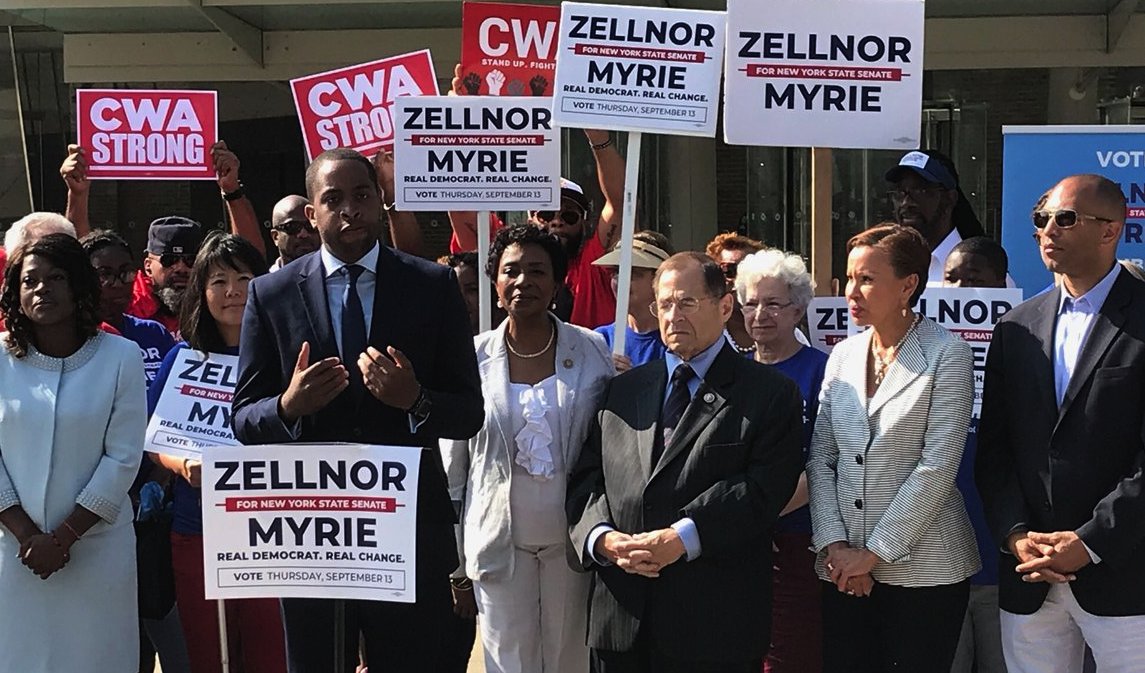
Zellnor Myrie receives the endorsement of Rep. Clarke, among others (photo: @BKIndivisible)
A wide swath of central Brooklyn is hosting its second contentious Democratic primary race this year. After a surprisingly close congressional primary in June, voters in a largely overlapping state Senate district will vote in September in another race where an incumbent is facing an upstart challenger.
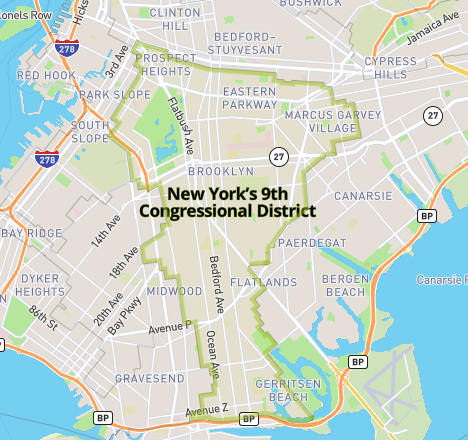 An array of neighborhoods in the borough, including Brownsville, Crown Heights, Park Slope, Flatbush, and Prospect Heights, make up New York’s Ninth Congressional District (map left), where Democratic voters narrowly voted to nominate Yvette Clarke for re-election over her challenger, Adem Bunkeddeko, in a race that drew national attention for its closeness, especially alongside the defeat of Rep. Joe Crowley by Alexandria Ocasio-Cortez.
An array of neighborhoods in the borough, including Brownsville, Crown Heights, Park Slope, Flatbush, and Prospect Heights, make up New York’s Ninth Congressional District (map left), where Democratic voters narrowly voted to nominate Yvette Clarke for re-election over her challenger, Adem Bunkeddeko, in a race that drew national attention for its closeness, especially alongside the defeat of Rep. Joe Crowley by Alexandria Ocasio-Cortez.
The Brooklyn neighborhoods of Clarke’s district, with the exception of a few, like Sheepshead Bay and Marine Park, also make up State Senate District 20 (map below), which adds Gowanus, South Slope, and Sunset Park, and is represented by incumbent Senator Jesse Hamilton, who is facing a primary challenge from Zellnor Myrie.
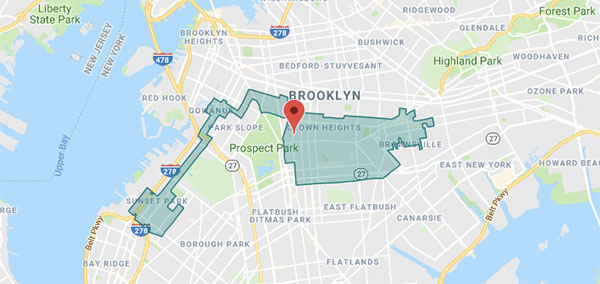 The two primaries bear some similar contours: a youthful progressive candidate goes for the left flank of a Democratic incumbent amid an anti-establishment milieu, hoping to motivate voters upset by Donald Trump and looking for something different from their elected officials. Bunkedekko’s success as a previously little-known activist and lawyer in the district—he lost by just 1,075 votes—may help provide a roadmap for Myrie, especially in terms of where in the district to go for those anti-establishment votes.
The two primaries bear some similar contours: a youthful progressive candidate goes for the left flank of a Democratic incumbent amid an anti-establishment milieu, hoping to motivate voters upset by Donald Trump and looking for something different from their elected officials. Bunkedekko’s success as a previously little-known activist and lawyer in the district—he lost by just 1,075 votes—may help provide a roadmap for Myrie, especially in terms of where in the district to go for those anti-establishment votes.
But there are key differences between the Clarke-Bunkedekko and Hamilton-Myrie races, including Hamilton’s prior membership in the breakaway Independent Democratic Conference and the flood of endorsements behind Myrie, but a key question for the challenger, incumbent, and all those watching, is: How much can we apply from the results of the race in Congressional District Nine to the race in State Senate District 20?
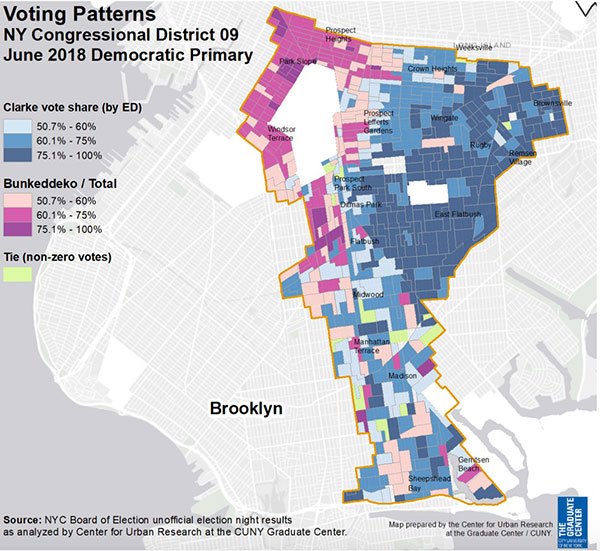 Though ultimately unsuccessful in his bid to unseat Representative Clarke, daughter of legendary former City Council Member Una Clarke, Bunkeddeko certainly came close, losing by four points to a politician who won her previous primary challenge, in 2012, by 77%. Results of the June 26 vote show Bunkeddeko’s strongholds were in wealthier, whiter, gentrified areas of the district like Park Slope and Prospect Heights, while Clarke excelled in poorer, predominantly black neighborhoods in the eastern part of NY-9 like East Flatbush and Brownsville (map left, via CUNY Mapping Service).
Though ultimately unsuccessful in his bid to unseat Representative Clarke, daughter of legendary former City Council Member Una Clarke, Bunkeddeko certainly came close, losing by four points to a politician who won her previous primary challenge, in 2012, by 77%. Results of the June 26 vote show Bunkeddeko’s strongholds were in wealthier, whiter, gentrified areas of the district like Park Slope and Prospect Heights, while Clarke excelled in poorer, predominantly black neighborhoods in the eastern part of NY-9 like East Flatbush and Brownsville (map left, via CUNY Mapping Service).
It remains to be seen whether this dynamic will be replicated in the race between Hamilton and Myrie. Hamilton is a former member of the Independent Democratic Conference, a coalition of eight Democrats in the New York State Senate that formed a years-long coalition agreement with Republicans to bolster GOP control of the chamber. The IDC formally disbanded this April amid criticism and the declaration of primary challenges by Myrie and a cohort of other candidates.
Myrie spokesman André M. Richardson told Gotham Gazette that the campaign was surprised by Central Brooklynites’ widespread knowledge of the IDC.
“More people knew about it than we thought would,” he said. “A lot of the conversation is in the Park Slope and Prospect Heights area, but folks in Flatbush recognize it, as well.”
Hamilton’s participation in the IDC is a useful cudgel for the Myrie campaign, providing a unifying talking point about propping up Republican control of the state Senate and blocking progressive legislation in a racially and economically diverse district.
In predominantly-black neighborhoods like Brownsville, Richardson said, the IDC ties Hamilton to the prevention of Andrea Stewart-Cousins from becoming the State Senate’s first black female majority leader; in heavily-Hispanic Sunset Park, the Myrie campaign tells voters that the IDC is why the Dream Act was blocked. Through this, and with an intense focus on the ever-relevant housing crisis, the challenger hopes to avoid the polarization of the district seen in the results from June and appeal to voters in every neighborhood. That effort is likely to be helped by the fact that Myrie has been endorsed by a wide swathe of elected officials and clubs, including Rep. Clarke and other elected officials from the area, such as Assemblymember Diana Richardson.
The IDC is one of several factors that complicate attempts to use the results of the Clarke-Bunkeddeko race to predict the Hamilton-Myrie contest, despite the two races taking place in, more or less, the same territory. Also, noted Steven Romalewski, director of the CUNY Mapping Service, to Gotham Gazette, “different groups of voters turn out for different races.” Only about 8.2% of eligible Democratic voters voted in the primary between Clarke and Bunkeddeko, making it difficult to generalize characteristics of the voter pool.
Voter turnout is expected to increase in September, when the Democratic nominees for the statewide positions of governor, lieutenant governor, and attorney general will also be decided. Two of those races feature black candidates from Central Brooklyn: Jumaane Williams, running for lieutenant governor, and Letitia James, for attorney general. Governor Andrew Cuomo and his primary opponent, Cynthia Nixon, have also focused campaign efforts in the area, aware that black voters are essential to winning Democratic primaries.
In last year’s September primaries for city elections, Senate District 20 was home to 21,000 voters, while only around 10,000 residents of the Senate district cast votes in June’s contest when the congressional primary was the only race on the ballot.
Though it’s nearly impossible to accurately predict whether increased turnout will help or harm Hamilton, who was first elected to the Senate in 2014, political consultant Jerry Skurnik told Gotham Gazette that “the gentrifiers” constitute a larger proportion of Senate District 20 than they do Congressional District Nine.
By Skurnik’s admittedly “not 100% accurate” demographic calculations, 82% of the Senate district lies within the Congressional district, and the overlapping area is about 72% black. But the overall Senate district is just slightly over 60% black, since it includes smaller portions of near-exclusively African-American neighborhoods like Brownsville and East Flatbush and extends farther out of Central Brooklyn, into neighborhoods like Gowanus and Sunset Park that have relatively few black residents. This could spell an advantage for Myrie, if Bunkeddeko’s strength in Park Slope is any indication, and if he is able to move the same voters to the polls while motivating others. But, there are many complicating factors, and neither Romalewski nor Skurnik felt comfortable prognosticating with any certainty.
In line with Romalewski’s cautioning that different races motivate different voters, Skurnik emphasized to Gotham Gazette that a race for the New York State Senate necessarily involves issues different from those in a contest for the U.S. House of Representatives. For instance, rent regulations are a marquee issue for state legislators, who will renegotiate current rent laws next year, while the issue is less central to Congressional races like Clarke and Bunkeddeko’s, though candidates for all offices must discuss housing affordability in New York City. Myrie may have an easier time mobilizing residents around his housing-focused campaign than Bunkeddeko, who devoted extensive time to attacking Clarke’s Congressional record (or lack thereof, as he framed it). But, Myrie is also focused on Hamilton’s record in the Senate, especially around progressive bills that have not passed because Republicans, supported by the IDC, did not favor them.
The polarized, racially and economically divided results of the NY-9 primary will not necessarily reproduce as such in Senate District 20, Skurnik said, because both Hamilton and Myrie have seen them. “Senator Hamilton knows what happened,” Skurnik said. “He knows where the Congresswoman did badly...He’s not going to be surprised.” The same holds true for Myrie, he added. If the results of the June primary can teach the candidates of District 20 anything, it seems, it’s what to avoid.
***
by Daniel Yadin for Gotham Gazette
@GothamGazette
Independence from Cuomo, or Lack Thereof, Becomes Flashpoint in Attorney General Race
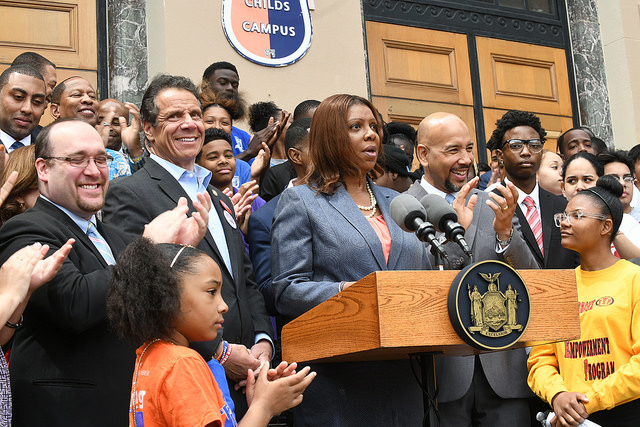
Cuomo & James (photo: The Governor's Office)
New York City Public Advocate Letitia James is performing a balancing act as she runs for state Attorney General, at once cross-endorsing with Governor Andrew Cuomo, a fellow Democrat seeking a third term, and accepting his fundraising support, while also attempting to convince skeptical voters that she would be sufficiently independent if both are victorious this fall.
After the shocking resignation of Eric Schneiderman amid domestic abuse allegations and James’ decision to run for attorney general, Cuomo quickly backed her, and she embraced his support and that of the State Democratic Party that he controls.
Given several other key facts -- the attorney general’s role as a popularly elected statewide official responsible for upholding the law and rooting out certain violations of the public trust, the rampant corruption in New York state government, including among former Cuomo aides, Cuomo’s efforts to raise funds and other support for James, and the governor’s reputation for overpowering other elected officials -- James has repeatedly faced questions about independence.
“I stand before you in the spirit of Shirley Chisholm: I’m unbought and unbossed,” James recently told Gotham Gazette, after a press conference at which she was endorsed by most of the women elected to the City Council. “And all throughout my career I’ve been independent and despite the innate, the sheer nature of who I am, and just based on my background, coming from Brooklyn, a humble woman, a woman of color, I’m someone who has been counted out but consistently has overperformed. I’m not beholden to anyone. All I’m beholden to is a simple concept and that’s called justice.”
James’ competitors in the Democratic primary for attorney general -- Rep. Sean Patrick Maloney, Zephyr Teachout, and Leecia Eve -- have each made a concerted effort to highlight the fact that they are not the state party- and Cuomo-backed candidate, while promising to pursue corruption in state government and be an independent voice if elected attorney general. They all also acknowledge that the attorney general must work closely with the governor on a lot of the office’s work, given that the attorney general defends the state against lawsuits and also files litigation on behalf of the state, often in conjunction with the governor. The winner of the Democratic primary will face Republican Keith Wofford and minor party candidates in the general election.
Though she has been careful not to criticize Cuomo, James is also promising to pursue bad actors in state government if elected attorney general, even if they are in the executive branch.
“If state officials step over the line, I will not hesitate to prosecute,” James said on a recent episode of the Max & Murphy podcast. “If I disagree with a state action, I will make that abundantly clear. I’ll make sure that the laws of the state of New York are enforced.”
And James has not shied away from Cuomo’s backing. “He is of the opinion that I am in a position to get things done and I have gotten things done,” she said when asked about their mutual support. “So, there is no quid-pro-quo, and there is no allegiance or loyalty to anyone. The only loyalty that I have is to the rule of law.” When asked to explain her endorsement of Cuomo, she first cited his leadership in helping Puerto Rico recover from Hurricane Maria (James recently joined Cuomo on a relief trip to the island), and mentioned his work in regards to marriage equality, economic development, women’s advocacy, and workers’ rights.
Meanwhile, corruption scandals have plagued Cuomo’s economic development programs, including two trials this year that ended with convictions of officials Cuomo had empowered. There has also been a series of corruption convictions of other state officials, including many state legislators, before and during Cuomo’s tenure. Cuomo ran for governor in 2010 promising to clean up state government, but has not accomplished that lofty goal.
When asked if Cuomo bears any responsibility for the recent malpractice that’s been exposed among his aides and donors, James stopped short of blaming him. “It really speaks to a larger issue and that is reform,” she said on Max & Murphy. She recommended reforming the state’s procurement process and creating checks and balance on mega agencies, both public and private. In a different interview, James recently said Cuomo should not have shut down the Moreland Commission to Investigate Public Corruption that he ended prematurely in 2015.
Maloney, who represents a Hudson Valley congressional district, has also endorsed Cuomo for reelection, while Teachout has endorsed Cuomo’s primary challenger, Cynthia Nixon, and Eve has said she is staying out of the gubernatorial primary.
Maloney’s campaign declined to provide comment for this article about his support for the governor, but in March, Maloney released a statement that urged Nixon not to run against Cuomo, citing his support for Cuomo’s work on LGBT rights in the state of New York, including passage of marriage equality, which led to Maloney and his husband’s vows.
“We must remember that Governor Cuomo took on the marriage equality issue when few politicians dared broach the subject,” Maloney said in the statement. “He was full-throated in his support and unabashed in his efforts, often to his political detriment. That’s called leadership.”
“We should not have intramural contests that only aid Republicans,” Maloney also said in the statement, urging a unified Democratic front in the Trump era.
But even given his support for Cuomo’s re-election, Maloney insists he would be an independent attorney general whether or not Cuomo is given another term. He’s also said James is “running a campaign that is propped up by insiders and the political machine,” as he told City & State NY. “That’s her race. My race is not to rely on the governor’s fundraising or the endorsements of Albany insiders or political bosses,” Maloney added.
“I think that is a losing strategy, and it is a terrible message right now when the Democratic Party voters I talk to want the Democratic Party blown up and rebuilt,” he continued, eventually saying that voters “don’t want somebody picked because of somebody else’s political agenda or some inside deal,” in apparent reference to Cuomo.
Acknowledging his endorsement of Cuomo and saying he’s been "a good governor,” Maloney said, “But I don’t think he should pick the attorney general. Let me ask you this: How is an attorney general going to look at the Buffalo Billion if you’re in Andrew Cuomo’s back pocket? So I think what this state deserves is someone with real independence and an independent ability to get elected and do the job.”
Meanwhile, Teachout’s bid for the attorney general’s seat comes after she stepped down as Nixon’s campaign treasurer this past May in order to run.
During her own appearance on Max & Murphy, Teachout said that, if elected attorney general, she would treat whoever wins the gubernatorial race the same. “You need to also have that independence because the attorney general’s office can’t be either perceived as or be an arm of the executive branch,” she said. “So, I’m not concerned about a smooth operation.”
Teachout has additionally centered her run for attorney general by eyeing both the Trump administration in Washington and Cuomo’s conduct in Albany, which she has criticized since she ran against him in the 2014 gubernatorial primary. “I think that’s very important not to be alleging crimes, but there’s no question that there’s a culture of corruption in Albany and that Andrew Cuomo has both promised to do something about it in 2010 and not only not done something about it, but encouraged instead a culture of secrecy.”
She said Cuomo has concentrated too much power.
Eve, meanwhile, has said she is not endorsing in the gubernatorial primary between Cuomo and Nixon.
“I am running, not as an endorsed candidate, not as the party candidate, but as an independent voice for New Yorkers,” said Eve on a recent episode of Max & Murphy. “And without question, [I] would prosecute corruption wherever I would find it, regardless of what administration or what person engaged in it.”
Eve, most recently a Verizon executive before taking a leave to run for attorney general, previously worked for Hillary Clinton, Joe Biden, and Cuomo, including overseeing the governor’s economic development programs, some of which became embroiled in the aforementioned corruption scandals (Eve was not at all implicated).
“I’m focused solely on my race and not engaging in others,” Eve said on Max & Murphy, “and I’m very proud, frankly, that I am not the endorsed candidate.”
***
by Chelsey Sanchez & Ben Max
***
by Ben Max, Gotham Gazette
@tweetBenMax @GothamGazette




